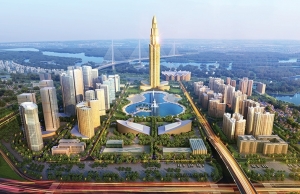Vietnam must follow smart city inclinations
How do you evaluate the development of smart cities in Vietnam so far?
 |
| Kok-Chin Tay, chairman of the Smart Cities Network |
Vietnam has made strides in developing smart cities since Hanoi, Ho Chi Minh City, and Danang took the lead as participating cities in the ASEAN Smart Cities Network in 2018. Some 48 out of 63 provinces in the country have or are building smart urban development schemes.
According to the Ministry of Construction, about 57 localities are implementing smart urban utilities and smart services, focusing mainly on traffic, smart healthcare, smart education, and developing warning applications. And 19 provinces are piloting smart urban services according to instructions from the Ministry of Information and Communications.
Hanoi, Ho Chi Minh City, Danang, Binh Duong, Thua Thien-Hue, Bac Ninh, and Binh Phuoc have achieved many successes in smart urban planning and management, smart urban applications in social-economic development, and improving the quality of life with smart utilities.
In my interactions with various city governments, national legislation has been made, and cities have taken the effort to form task forces to oversee the development of smart cities. Vietnam has attracted huge investments in smart cities over the years, often involving Singapore stakeholders. These have remained among the top investment destinations in ASEAN.
A key aspect of smart cities development is the promotion of “public, private, people” partnerships, where policies have to be drafted to allow such partnerships to grow. This is the third area of my presentation at the Vietnam-Asia Smart City Summit in November 2023 in Hanoi, which is to promote bankable projects to help address city problems for more people-centric smart cities.
It is expected that smart city development will be featured prominently in the coming years. To support development, it is important to create a more favourable legal environment. In addition, urban areas should pay more attention to smart planning of basic and essential physical and digital infrastructure.
What challenges face smart city development here, and what are some approaches elsewhere?
 |
The key advantages of smart city development are in three areas: Improving the quality of life, shaping a competitive economy, and developing a sustainable environment, enabled by digital applications and platforms, partnerships and funding.
The key challenge is the lack of visionary leaders willing to form dedicated teams and allocate huge budgets to develop smart cities, over a sustained period. Another challenge is the lack of resources - due to lack of capacity building among government officials on smart cities.
Vietnam should establish a dedicated ministry to oversee smart city development - with resources in the cities to assist city leaders in their journey. Many smart cities in the world have done this.
The Cities Investment Facility, a global programme by UN-Habitat, is an innovative, multi-stakeholder initiative centred around unlocking significant investment in urban infrastructure projects in low- and middle-income markets that have traditionally struggled with project preparation as well as investment readiness.
Vietnam can learn from this project in relation to tourism development in Mayan rivers in Mexico. According to the Regional Programme for Tourism Development, the Ríos Mayas Route is a tourism development project with an inclusive, sustainable and territorial planning orientation that integrates six municipalities in the state of Tabasco, Mexico.
It is a model of economic, social and environmental innovation that promotes governance schemes to create alliances for the sustainable management of the Mayan rivers and its surroundings to strengthen urban-rural links and productive chains. This model will attract investment, promote decent work and socioeconomic growth and diversification, motivate tourism and its better distribution, and encourage responsible production and consumption.
Vietnam could learn from this Mexican example by developing smart regions centred around large urban areas.
What are the trends in smart city development this year and beyond?
Globally, about 4.4 billion people live in cities today, and $4.2 trillion is the annual infrastructure financing gap per year globally. Around $90 trillion is the amount required for infrastructure assets for the next 15 years.
The main barriers to increased investment are not a lack of available finance, but rather a lack of well-prepared and investment-ready projects. Hence, one global trend is for investments into development countries and their cities to be tied to bankable projects that are investment-ready.
Another global trend is regional collaboration, led by the city-to-city partnerships in the ASEAN Smart Cities Network. Last year, smart cities in the network and smart cities of the Gulf Cooperation Council member states issued a press release to foster exchanges of best practices to help build cities that are resilient, innovative, well-connected, and technologically advanced.
Other examples include the European example in Bolzano-Bozen in Italy, for a territorial approach to the implementation of the sustainable development goals, and in Cambodia for its smart city development to support the implementation of the New Urban Agenda by UN-Habitat.
I expect Vietnam to follow such trends. Smart city command centres have been established in more and more cities in Vietnam. So now, the trend is to leverage such command centres to capture data via sensor networks, process the data, provide various dashboards, develop digital twins, and introduce AI capabilities.
Hanoi, together with other ASEAN cities, has been invited to join the UN-Habitat pipeline to leverage innovative technologies. The proposed focus will be on smart and sustainable cities, with an ecosystem approach, aligned to the New Urban Agenda.
 | Vietnam pushes on with smart city plans Vietnam is accelerating construction to support establishment of smart city projects combined with top-class technology to enhance both the country’s management and the economy. |
 | Smart cities the biggest game for startups in Vietnam A smarter lifestyle that caters to the citizens of the 21st century and helps protect the planet and stands high on Vietnam’s agenda in urban development, opening many chances for local and foreign-funded startups in the country. |
 | Smart cities on the tech titan radar With smart cities being among the advances in Vietnam, domestic and foreign investors are venturing further into new projects to benefit from future growth potential, with new initiatives being in the gun barrel. |
What the stars mean:
★ Poor ★ ★ Promising ★★★ Good ★★★★ Very good ★★★★★ Exceptional
Related Contents
Latest News
More News
- Masan Consumer names new deputy CEO to drive foods and beverages growth (February 23, 2026 | 20:52)
- Myriad risks ahead, but ones Vietnam can confront (February 20, 2026 | 15:02)
- Vietnam making the leap into AI and semiconductors (February 20, 2026 | 09:37)
- Funding must be activated for semiconductor success (February 20, 2026 | 09:20)
- Resilience as new benchmark for smarter infrastructure (February 19, 2026 | 20:35)
- A golden time to shine within ASEAN (February 19, 2026 | 20:22)
- Vietnam’s pivotal year for advancing sustainability (February 19, 2026 | 08:44)
- Strengthening the core role of industry and trade (February 19, 2026 | 08:35)
- Future orientations for healthcare improvements (February 19, 2026 | 08:29)
- Infrastructure orientations suitable for a new chapter (February 19, 2026 | 08:15)

 Tag:
Tag:


















 Mobile Version
Mobile Version